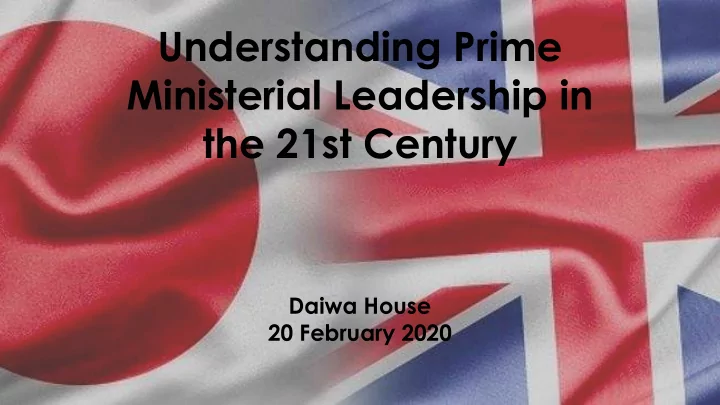

Understanding Prime Ministerial Leadership in the 21st Century Daiwa House 20 February 2020
Fathoming Fragility and Seeking Stability: Understanding Prime Ministerial Leadership in the 21st Century We are exploring the phenomenon that the prime minister is becoming stronger in Japan at the same time that the UK prime minister seems to be weakening. Traditionally the Japanese prime minister was regarded as a transient, weak, compromise figure but this has changed in recent years. In the UK intra-party and executive-legislative dynamics have shifted in a way that has weakened the prime minister.
Summit venue UK PM Japanese Paris 1989 Thatcher Uno Toyako 2008 Brown Fukuda and year PM Houston 1990 Kaifu L’Aquila 2009 Aso London 1991 Major Huntsville 2010 Cameron Kan Rambouillet 1975 Wilson Miki Munich 1992 Miyazawa Deauville 2011 San Juan 1976 Callaghan Tokyo 1993 Camp David Noda London 1977 Fukuda 2012 Naples 1994 Murayama Lough Erne 2013 Abe Bonn 1978 Halifax 1995 Brussels 2014 Lyon 1996 Hashimoto Tokyo 1979 Thatcher Ohira Schloss Elmau Denver 1997 Blair Venice 1980 Absent 2015 Birmingham 1998 Ise Shima 2016 Ottawa 1981 Suzuki Cologne 1999 Obuchi Taormina 2017 May Versailles 1982 Okinawa 2000 Mori Charlevoix 2018 Genoa 2001 Koizumi Williamsburg 1983 Nakasone Biarritz 2019 Johnson Kananaskis 2002 London 1984 Evian 2003 Bonn 1985 Sea Island 2004 Tokyo 1986 Gleneagles 2005 St Petersburg 2006 Venice 1987 Heiligendamm 2007 Abe Toronto 1988 Takeshita UK and Japanese leaders’ participation in G7/8 Summits, 1975 -2019
Understanding Prime Ministerial Leadership: Existing Perspectives Perspective Focus References Mackintosh, Jones, Smith, Executive Politics Approaches Constitutional infrastructure Rhodes, etc. Prime Ministerial versus Cabinet Government leading to core- executive studies Party System dynamics Heffernan, Webb, Cowley, Party Leadership Intra-party dynamics, Quinn, Heppell, etc vulnerability and resilience Individual Talent Theakston, Norton, Gill, Denver, Skills and Style Performative skills and styles and Garnett, etc. how they relate to governing competence Presidentialism, predominance, Foley, Poguntke, Webb, King, Modelling approaches personalisation, celebrity politics Heffernan, Bennister, etc.
A Multi-layered Approach to Understanding Prime Ministerial Leadership Contextual Executive Politics Party Leadership Skills and Style Psychological
A Multi-layered Approach to Understanding Prime Ministerial Leadership PERSPECTIVE FOCUS REFERENCES Micro ⇠⇢ Meso ⇠⇢ Macro Socio-Political Change Contextual Many but possibly not Inequality, changing nature of work, inter- Approaches targeted on PM generational tensions, new social dynamics, anti- leadership. Keane, political sentiment, post-democracy, populism, Mounk, Dalton, change and continuity in anchorage points Crouch, etc Constitutional infrastructure Mackintosh, Jones, Executive Politics Prime Ministerial versus Cabinet Government Smith, Rhodes, etc. Approaches leading to core-executive studies Party System dynamics Heffernan, Webb, Party Leadership Intra-party dynamics, vulnerability and resilience Cowley, Quinn, Approaches Heppell, etc Individual Talent Theakston, Norton, Gill, Skills and Style Performative skills and styles and how they relate to Denver, Garnett, etc. Approaches governing competence - Presidentialism, predominance, personalisation, celebrity politics Psychological Cognitive Ability/Frailty Owen, Weinberg, Profile Hubris syndrome, emotional intelligence, empathy, Flinders, etc. etc.
Comparing Recent UK Prime Ministers: A Multi-layered Approach Prime Term Context Executive Politics Party Dynamics Skills and Style Psychological Minister May Post-Financial No Majority. Divided party. Had to govern through Wanted to be liked David 2010 to Crisis Coalition government. Referendum fractured coalition. Could not and regarded as a Cameron July 2016 Brexit Weak power base. system cope with Brexiteers. regular guy Wanted to be liked July 2016 Brexit Promised ‘strong Lost her legislative Maybot. Lack of Introverted. Christian. Theresa to July Populism leadership’ but could majority. Dependent emotional intelligence. Conformist. Cold. May 2019 not deliver. Called on Democratic Not comfortable with Robotic. 2017 election but Unionists. the public or even with Unable to make adopted a Could not heal a colleagues. No small tough decisions. Kept presidential campaign divided party. LINO talk. Possibly a good PM changing mind. that backfired in more calmer Questions about how ‘normal’ times. she coped with the Poor with the media. pressure July 2019 Brexit Appointed by party Viewed by party as Charismatic, buffoon, Self-interested, non- Boris - present Populism members not MPs. Not ‘high risk’ – this was unconventional and conformist, ‘heroic’ Johnson liked, not trusted, apparently ‘priced in’ chaotic, widely viewed leader, no ethical divisive. Clear populist to his appointment – as the British Trump. foundations, ‘them and us’ rhetoric prorogued parliament No emotional dysfunctional. to widespread anger intelligence or Arguably the only sensitivity. Presidential politician able/willing style (?) Visionary (?) to break the Brexit Very Good with the deadlock. media ‘Crisis leader’
Comparing Recent Japanese Prime Ministers: A Multi-layered Approach Prime Term Context Executive Politics Party Dynamics Skills and Style Psychological Minister September Changing nature Cabinet reflected Natural successor to Synonymous with North Member of Abe 2006 to of work and LDP factions. Koizumi. Member of Korean abduction issue. Japanese Shinzo September unequal society Ministerial scandals leading LDP faction. Youngest postwar prime political elite – 2007 ( kakusa shakai ). and loss of control of minister. Can’t read the father and Continuing ‘war Upper House mood ( kuki ga yomenai ). grandfathers. on terror’. Ill health Patriot Tensions with China. January Triple disasters of Cabinet dominated Divided party. Won Legal training and Campaigner Kan 2010 to 3/11. by own leadership election but background in grassroots and activist. Naoto September Continuing fallout appointments faced leadership civil society. Willing to Impulsive. 2011 from Financial ignoring DPJ factions. challenge from Ozawa challenge the Reputational Crisis. Tense relationship Ichiro and vote of no government as seen in damage from with bureaucracy confidence. Survives by HIV blood product extra-marital promising to resign. No scandal. Short-tempered and pension majority in Upper House. ( ira-Kan ) scandals December Abenomics. Strong core Wins three terms as LDP ‘Japan is Back’ – strong A rare second Abe 2012 to Rise of China. executive. National President (fourth?). No and stable in face of attempt as Shinzo present Threat of North Security Council. obvious successor fractured opposition and prime minister – Korea. Landslide electoral hostile external redemption? Tokyo Olympics. victories. Super- environment. Manages Patriot majority in coalition. media closely and uses Survives scandals celebrity
Recommend
More recommend